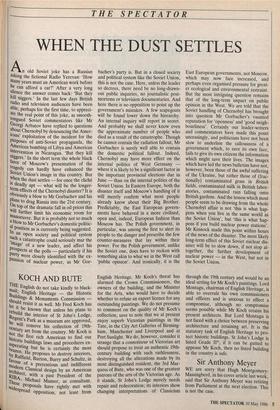THE SPECTATOR
WHEN THE DUST SETTLES
An old Soviet joke has a Russian asking the fictional Radio Yerevan: 'How many years must an American work before he can afford a car?' After a very long Silence the answer comes back: 'But they kill niggers.' In the last few days British radio and television audiences have been able, perhaps for the first time, to appreci- ate the real point of this joke, as smooth- tongued Soviet commentators like Mr Oeorgi Arbatov have replied to questions about Chernobyl by denouncing the Amer- icans' exploitation of the incident for the Purposes of anti-Soviet propaganda, the American bombing of Libya and American intervention in Nicaragua. 'But they kill tuggers.' In the short term the whole black farce of Moscow's presentation of the tragedy can hardly have enhanced the Soviet Union's image in this country. But When the dust settles — for once the cliché is deadly apt — what will be the longer- term effects of the Chernobyl disaster? It is obviously a blow to Mr Gorbachev and his cans to drag Russia into the 21st century. n top of the dramatic fall in oil prices this will further limit his economic room for manoeuvre. But it is probably not so much a blow to Mr Gorbachev's domestic politic- Position as is currently being suggested. hi an open society and political system such a catastrophe could seriously mar the image of a new leader, and affect his Prospects at the polls — particularly if his Party were closely identified with the ex- Pansinn of nuclear power, as Mr Gor- bachev's party is. But in a closed society and political system like the Soviet Union, this is not the case. Here, unless the leader so decrees, there need be no long-drawn- out public inquiries, no journalistic post- mortems or television documentaries. And here there is no opposition to point up the government's mistakes. A few scapegoats will be found lower down the hierarchy. An internal inquiry will report in secret. And probably we shall never know even the approximate number of people who died as a result of the catastrophe. Though he cannot contain the radiation fallout, Mr Gorbachev is surely well able to contain the domestic political fallout. Indeed, Chernobyl may have more effect on the internal politics of West Germany — where it is likely to be a significant factor in the important provincial elections due in June — than on the internal politics of the Soviet Union. In Eastern Europe, both the disaster itself and Moscow's handling of it will merely confirm what most people already know about their Big Brother. Predictably, the East European govern- ments have behaved in a more civilised, open and, indeed, European fashion than Moscow has. The Polish government, in particular, was among the first to alert its people to the danger and prescribe the few counter-measures that lay within their power. For the Polish government, unlike the Soviet one, does have to reckon with something akin to what we in the West call 'public opinion'. And ironically, it is the East European governments, not Moscow, which may now face increased, and perhaps even organised pressure for great- er ecological and environmental restraint. But the most intriguing question remains that of the long-term impact on public opinion in the West. We are told that the Soviet handling of Chernobyl has brought into question Mr Gorbachev's vaunted reputation for 'openness' and 'good neigh- bourliness'. Certainly our leader-writers and commentators have made this point unceasingly, and politicians have not been slow to underline the callousness of a government which, to save its own face, fails to give its own citizens the information which might save their lives. The images which have led the news bulletins have not, however, been those of the awful suffering of the Ukraine, but rather those of (frac- tionally) contaminated grass in British fields, contaminated milk in British labor- atories, contaminated rain falling onto British gardens. And the lesson which most people seem to be drawing from the whole Chernobyl affair is not 'this is what hap- pens when you live in the same world as the Soviet Union', but 'this is what hap- pens if you build nuclear power stations'. Mr Kinnock made this point within hours of the news of the disaster. The most likely long-term effect of this Soviet nuclear dis- aster will be to slow down, if not stop al- together, the further development of nuclear power — in the West, but not in the Soviet Union.


























































 Previous page
Previous page